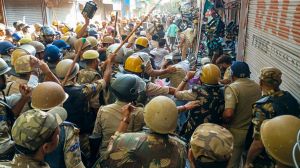Protests reek of intolerance: Film fraternity
MUMBAI, DEC 5: The reference of the film Fire to the Central Board of Film Certification (CBFC) in the wake of the violent opposition to ...

MUMBAI, DEC 5: The reference of the film Fire to the Central Board of Film Certification (CBFC) in the wake of the violent opposition to it has only strengthened the resolve of film personalities like Mahesh Bhatt and Javed Akhtar to press with the public interest litigation in the Supreme Court.
The letter-petition asking for the apex court’s intervention in the situation since the violent demonstrators were congratulated by Chief Minister Manohar Joshi, is being readied in detail to be presented to the apex court on Monday. “The Chief Minister might want to retract (from his statement congratulating the demonstrators), but the fact remains that the film had a valid censor certificate,” says filmmaker Mahesh Bhatt.
Bhatt’s film, Zakhm, is facing censor problems with it making the rounds of the CBFC, the Home Department, the police and now once again the Censor Board.
“In the end just how many people should review a film?” he asks disgustedly, stating emphatically that we are living intimes of a cultural emergency. “I seriously think that censorship is an important issue in the country where there is more and more intolerance. Somebody needs to bring back sanity, somebody who can perhaps address the issue”, he says.
The group comprising Bhatt, Javed Akhtar, advocate Atul Setalvad and playwright Vijay Tendulkar will be meeting tomorrow to finalise the nitty gritties of the petition. Their petition, heard by the Chief Justice on Friday and referred to a bench led by Justice A P Mishra, urges the Supreme Court’s intervention into a violation of the fundamental rights of the audience who wanted to see the film. It observes that any objection to a film which had been cleared by the Censor Board should be made in the court of law and not by hooligans taking the law into their own hands.
“The referring of the film to the CBFC does not change our stand,” said Javed Akhtar, “we shall see how the petition fares in the Supreme Court on Monday”.
Bhatt questions the key issue — that of lawand order. He refers to the statement of Union Minister of State for Information and Broadcasting Mukhtar Abbas Naqvi who said that the film was creating a law and order problem in the country. “I mean,” he says in his inimitable style, “does a few theatres in Delhi and Mumbai form a country? Just a handful of people against the film constitute the country’s opposition? Should every state have a separate censor board? Then why do we call it the Union territory of India?” he asks.
He challenged Naqvi to explain the law and order question when the group that attacked the theatre halls in Delhi actually sent press releases citing the time and venue of their attack. And it happened exactly as the releases said. What kind of a law and order machinery is at work?” he asked.
At the most, he reasoned, the police can cancel the shows of the particular theatre till the law and order situation is stable, but why generalise it, he wondered. “They are playing strange games, I mean films and entertainment are theleast of the issues concerning the government, there are more pressing issues,” he said. He felt that the common man could not be conned into believing the law and order bogey that the government was putting forth. “And anyway, even after the reappraisal by the CBFC, there is no guarantee that the film will be shown in Maharashtra,” he pointed out.






- 01
- 02
- 03
- 04
- 05

























